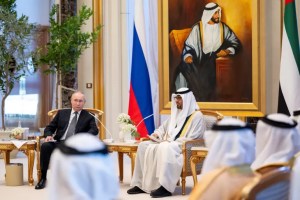Since Iran’s missile strike on the Nevatim air base on October 1, and Israel’s promised retaliation, several friends and readers have posed the following question to me: Will Iran attack the Gulf states, namely U.S. military bases in Saudi and the UAE? Conceivably, the question constitutes a legitimate concern—given Iran’s uneasy political past with its Gulf neighbors. Notwithstanding, my wager is that it won’t pursue such a heedless endeavor.
The reason for Iran refraining from doing so is manifold…
Obviously, the last thing Iran needs right now is further divisive escalation with its coreligionists and neighbors, let alone opening unnecessary war front in its immediate neighborhood; especially with its chief regional proxy, Hezbollah, overwhelmed by a brutal Israeli incursion and a series of decapitating assassinations. The Houthis in Yemen are suffering tremendous blows too. Moreover, insofar Syria is concerned, an Iranian-Gulf conflict is one wherein standing on the sidelines is the only option it has, all things considered [emphasis added].
Having that said, on a regional level, Iran will have to stand alone in a conflict with the Gulf states.
But, what about its international allies, some may wonder? What about Russia and China? What position would they take in such a conflict?
Well, what are the facts?
The truth of the matter is this:
Even if we put all the commotion they’re currently dealing with on multiple international theaters aside (Ukraine and Taiwan, to name a couple), neither Russia nor China would support Iran on this. For, at the end of the day, they both have colossal direct investment spread across the GCC countries. To elucidate further, let us consider Russian and Chinese investments in the United Arab Emirates alone.

According to ‘leaked records’, Russian investment in Dubai properties have surged dramatically—exceeding tenfold—since the beginning of the SMO in Ukraine in 2022. The same article reports that, “Russian nationals have bought up $6.3 billion in existing and in-development properties in Dubai, a group of economists with the EU Tax Observatory and Norway’s Centre for Tax Research estimated in a recent report,” (Acosta). The massive flow of Russian capital into the country is perfectly understandable, given the strong political and economic ties the two nations have enjoyed and fostered over the course of recent decades—let alone the harmony and accord they have vis-á-vis international and regional issues.
In December last year, President Putin has made a short trip to the Middle-East and met with both President Sheikh Mohammed bin Zayed Al Nahyan and the Saudi Crown Prince Mohammed bin Salman. The warm welcome he received in the United Arab Emirates, which included a 21-gun salute (not to mention the military jets show, trailing smoke in the color of the Russian flag), echoed deeply rooted friendship and symbolized a well-founded strategic partnership. His Emirati counterpart described Putin as his ‘dear friend,’ while the latter expressed his profound appreciation for the former’s ‘position’ and reaffirmed the UAE being Russia’s ‘main trading partner in the Arab World,’ (“Putin Makes Rare Trip to Middle East to Meet with UAE and Saudi Leaders”).

It is also worth noting that President Xi’s visit to the Arab nation back in 2018 has, “upgraded the UAE-China bilateral relationship to a ‘comprehensive strategic partnership’, characterized by frequent high-level exchanges and strengthened political mutual trust,” (Interesse).
And if all this is not reassuring enough, then the UAE’s impending bid to join the BRICS block is definitely something to be taken into consideration.
In short, any Iranian strike on the United Arab Emirates, or Saudi Arabia for that matter, will run the risk of sabotaging Russian and Chinese geo-strategic interests—despite the strike being originally intended against U.S. assets in the region. As a result, both Russia and China may have to either oblige Iran to make commensurate compensations, which it cannot afford, or risk severance of ties. That is a gamble Iran cannot afford to make, for it will certainly cost the country its most vital allies in the international sphere and only defenders on the UNSC.
Related Publications: “Trump’s Assassination Attempt, Netanyahu U.S. Visit, and Paris Olympics Opening Ceremony: Destroying the Possibility of Peace;” “Regardless… War Is Coming…” “Regardless… War Is Coming… [Part II];” and, “How Could the Middle-East Be the End of NATO: A Scenario;” “Middle-East: War Is at Hand, What Is Next?” And, “From the Middle-East to East Asia: The Orchestration of a World War Face-off .”
Reference
Acosta, Carmen M. “Russians Bought Up $6.3B in Dubai Property After 2022 Ukraine Invasion, Report Finds.” ICIJ, 24 May 2024, www.icij.org/news/2024/05/russians-bought-up-6-3-billion-in-dubai-property-after-2022-ukraine-invasion-report-finds/.
Interesse, Giulia. “UAE and China: Trade and Investment Profile.” Middle East Briefing, 20 May 2024, www.middleeastbriefing.com/news/uae-china-trade-investment-relations-and-bri-engagement/.
“Putin Makes Rare Trip to Middle East to Meet with UAE and Saudi Leaders.” Al Jazeera, 6 Dec. 2023, www.aljazeera.com/news/2023/12/6/putin-makes-rare-trip-to-middle-east-to-meet-with-uae-and-saudi-leaders.







